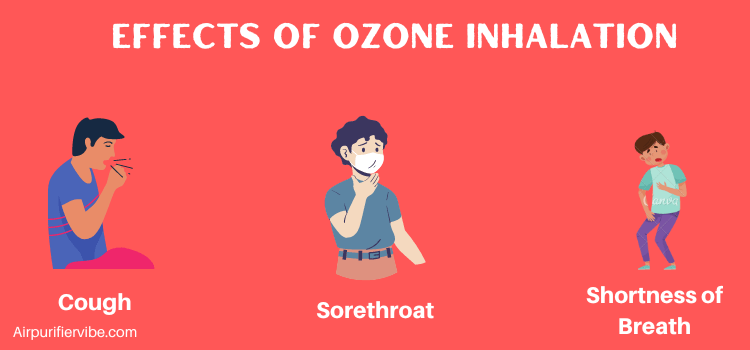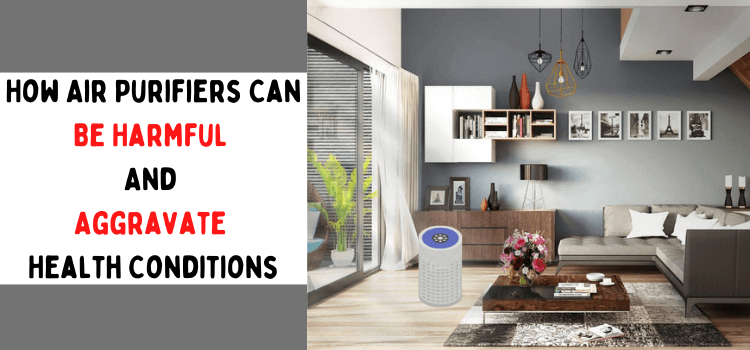This comes as a surprise to many of us, that air purifiers can be harmful and even worsen our Health.
But, this is true to some extent. Because not all air purifiers function on the same principle.
Today, there are different types of air purifiers available on the market that claim to be safe, which is not true.
Air purifiers that use Ozone to improve the indoor air quality of your room are unsafe, though they market as air cleaners.
Here in this article, we covered how air purifiers can be harmful and worsen our health, in addition to types of air purifiers for our better understanding. Read on to find which type of air purifier is safe.
How Air Purifiers Can be Harmful and Aggravate Health Conditions?
Air purifiers are considered to be important appliances for a healthy lifestyle as they provide clean and healthy air. But there are air purifiers that do more harm than good.
Air purifiers are available in many varieties from different brands today in the market, they work on different technologies.
There are air purifiers that use ozone to purify the indoor air and these are called Ozone generators. Manufacturers of ozone generators claim that these devices are safe.
But the question here is, Is it safe for our health?
No, these are not safe for our health.
It is observed that concentrations of ozone that are within the limit of public health standards are ineffective in removing biological pollutants, chemical pollutants, and odor.
That’s the reason, these air purifiers require high concentrations of ozone to remove pollutants and odor from the air.
Ozone when inhaled in high concentration can cause respiratory-related issues.
If a patient suffering from chronic obstructive pulmonary disease or other respiratory conditions, if exposed to ozone can aggravate their health conditions. Ozone generators are unsafe for respiratory ailment patients.
There are other air purifiers in the market that release negative ions to clean the air called ionic air purifiers. Negative ions from this air purifier attach to the particles in the air.
After bonding with the particles, the weight of the particle increases becomes unstable in the air, and falls on the ground.
They fall either on the wall, floor, tabletop, or curtains, this cluster needs to be wiped or dusted.
If it is not wiped, these clusters get loosened and may re-contaminate the fresh air.
Indirectly, these air purifiers also produce ozone, which is a major concern as it affects the health of patients.
Overall, air purifiers that produce ozone (ozone generators, Ionic air purifiers) are not safe, though they market them as safe for indoor use.
Types of Air purifiers:
As you have understood all air purifiers do not improve health conditions. Now you need to know the types of air purifiers available on the market.
Knowing the types of air purifiers will help you to make wise decisions in selecting the right air purifier that improves your indoor air quality and health condition.
Generally, There are three different types of air purifiers you will find on the market. Ozone Generators, Ionic Air Purifiers, and HEPA Filters.
As mentioned earlier in the above section about ozone generators and ionic air purifiers, now let’s discuss them in detail.
Apart from this, we’ll understand about HEPA air purifiers.
Let’s get started!
Ozone Generators:
Ozone generators release high concentrations of ozone gas to clean the indoor polluted air.
Ozone is a highly reactive gas. Ozone generator helps to kill bacteria, viruses, molds, and air-borne particles present in the air.
California Air Resources Board (CARB) recommends ozone generators be used for industrial purposes where harmful ozone exposure to humans is prevented.
It also recommends that ozone generators should not be used for cleaning indoor air as these are ineffective. Inhaling ozone gas can pose serious health issues to humans and animals.

Effects of Ozone inhalation on Health:
Ozone when inhaled in low concentration causes cough, chest pain, and throat irritation.
If a person suffering from a chronic obstructive pulmonary disease such as asthma, inhaling ozone can be harmful and worsen the health condition.
So, it is recommended to use an air purifier that emits low (usually near-zero) emissions of ozone. For this, you need to look for an air purifier that is CARB-certified.
CARB-certified air purifiers are the ones that emit low or near-zero emissions of ozone. These air purifiers are under the regulation of the California Air Resources Board (CARB).
Ozone generators provide more harm than good. So, these air purifiers should be avoided as they are unsafe for residential use.
Ionic Air purifiers:
Ionic Air purifiers are also known as air Ionizers. Air Ionizer removes air-borne particles by using negative ions.
The study found that negative ions from ionic Air purifiers help to increase immunity and decrease stress.
Ionic air purifiers help in purifying the air but they have potentially harmful effects on your health as it indirectly releases ozone into the air.
Negative ions bind to the air-borne particles and settle them down either on the floor, wall, or curtains.
Later these particles need to be removed by wiping or dusting with the vacuum cleaner.
If not, these particles accumulate, get loosen which eventually re-contaminates the fresh air in the room.
The downside of Using an Ionic Air purifier:
Ionic air purifiers indeed have positive effects on health, but they can also worsen health by releasing ozone into the air.
Ionic Air purifiers do more harm than good to your health
Ozone on inhalation causes cough, throat pain, and shortness of breath in low concentration.
HEPA Air Purifiers:
Air purifiers that use HEPA filters are more effective in cleaning the air when compared with the other two air purifiers.
These air purifiers with HEPA filters can remove at least 99.97% of airborne particles such as dust, pollen, pet danders, and bacteria as small as 0.3 microns.
A Study was conducted to know whether the placement of a Portable HEPA Air purifier will improve the health of COPD patients.
They observed that HEPA Air purifier has health benefits for COPD Patients.
However, these air filters cannot remove gaseous substances such as VOCs, odors, and gases such as radon.
Now you may think that HEPA Air purifiers can take care of Physical particles in the air, but what about the gaseous pollutants in the air?
Do not worry, there is another filter called an Activated carbon filter which can adsorb gaseous pollutants present in the air.
You need to look for Air purifiers that have both a HEPA Filter and also Activated carbon filter. And these kinds of Air purifiers are also available on the market.
Activated carbon filters can adsorb gaseous substances such as Volatile Organic Compounds (VOCs), Bad odors, and also toxic gases such as radon as well.
In Hospitals, Medical grade air purifiers are used to provide clean air to the patients. These air purifiers include HEPA filters and also activated carbon filters.
Conclusion:
Air purifiers help improve the quality of indoor air. However, all air purifiers are not suitable for residential purposes. Ozone generators are suitable for industrial purposes and it is not recommended for residential purposes. It is unsafe for you and your family to use Ozone generators.
Similarly, Ionic Air purifiers are not suitable for patients with respiratory conditions as these air purifiers also release ozone gas.
HEPA Air purifiers can filter the physical particles present in the polluted air, they cannot remove gaseous substances from the air.
It is recommended to use air purifiers that are with both HEPA filters and activated carbon filters that help to remove both physical and gaseous pollutants from the air.
Frequently Asked Questions (FAQs)
Can air purifiers cause health problems?
Yes, Air purifiers can cause health problems if you choose to buy an ozone generator or ionic Air purifier.
Do all air purifiers emit ozone?
No, not all air purifiers emit ozone. Ozone generators and Ionic Air purifiers emit ozone gas into the air.
Low or near-zero levels of ozone gas are produced by air purifiers certified by CARB.
Can you smell ozone in the air?
Yes, Ozone can be smelled even in smaller concentrations. Ozone smell is described as Like a burning wire, like chlorine, sweet and pungent.

